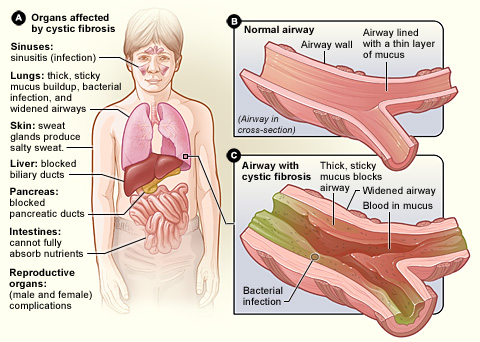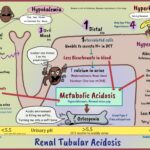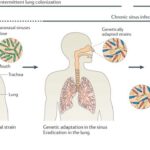Respiratory cystic fibrosis (CF) is a severe, inherited disorder that primarily affects the lungs and respiratory system. This genetic condition leads to the production of thick, sticky mucus that clogs airways, creating a fertile ground for chronic infections and progressive respiratory decline. Early diagnosis and comprehensive treatment are crucial in managing symptoms and enhancing the quality of life for those affected.

The Genetic Cause Behind Respiratory Cystic Fibrosis
Cystic fibrosis is caused by mutations in the CFTR (Cystic Fibrosis Transmembrane Conductance Regulator) gene. This gene regulates the movement of salt and water in and out of cells. Mutations disrupt this function, resulting in the accumulation of dense mucus in the lungs and other organs.
- Inheritance Pattern: Cystic fibrosis follows an autosomal recessive inheritance pattern. A child must inherit one defective copy of the CFTR gene from each parent to develop the condition.
- Most Common Mutation: The ΔF508 mutation accounts for nearly 70% of cases worldwide.
How Respiratory Cystic Fibrosis Affects the Lungs
The respiratory complications of cystic fibrosis are its most life-threatening aspects. The thick mucus obstructs airflow, traps bacteria, and leads to persistent infections and inflammation. Over time, repeated infections cause scarring (fibrosis) and damage to lung tissue, severely impairing respiratory function.
Common Respiratory Symptoms
- Chronic, productive cough
- Frequent lung infections, including pneumonia and bronchitis
- Shortness of breath and wheezing
- Sinus infections
- Nasal polyps (growths inside the nasal passages)
Diagnosing Respiratory Cystic Fibrosis
Early and accurate diagnosis of cystic fibrosis is essential for effective management.
Newborn Screening
Most countries implement routine newborn screening for CF. A positive screening result prompts further testing.
Sweat Test
The gold standard for diagnosis measures the concentration of chloride in sweat. Elevated levels confirm CF.
Genetic Testing
Identification of mutations in the CFTR gene provides a definitive diagnosis and can inform treatment choices.
Additional Diagnostic Tools
- Chest X-rays and CT scans to assess lung damage
- Pulmonary function tests to measure breathing capacity
- Sputum cultures to identify bacterial infections
Comprehensive Treatment Strategies for Respiratory Cystic Fibrosis
Managing respiratory cystic fibrosis requires a multidisciplinary approach tailored to the individual’s needs. Treatments focus on clearing mucus, preventing infections, and improving lung function.
Airway Clearance Techniques
Regular physical methods, such as chest physiotherapy, help loosen and expel mucus from the lungs.
Medications
- Bronchodilators: Relax airway muscles to enhance airflow.
- Mucolytics: Thin the mucus, making it easier to clear.
- Antibiotics: Treat and prevent bacterial infections, administered orally, intravenously, or via inhalation.
- Anti-inflammatory Drugs: Reduce lung inflammation and slow disease progression.
- CFTR Modulators: Target the defective protein and improve its function for specific mutations.
Lung Transplantation
In severe cases where respiratory function deteriorates significantly, lung transplantation may be considered.
Vaccinations
Annual flu shots and pneumonia vaccines are critical to protect against respiratory infections.
Daily Management and Lifestyle Modifications
Successful management of respiratory cystic fibrosis extends beyond medical treatments.
- Nutrition: A high-calorie, high-protein diet supports lung health and overall energy needs.
- Hydration: Proper fluid intake thins mucus and aids in clearance.
- Exercise: Physical activity improves lung function and mucus clearance.
- Infection Control: Rigorous hygiene practices reduce exposure to harmful bacteria.
The Future of Respiratory Cystic Fibrosis Care
Advancements in gene therapy, personalized medicine, and innovative drug therapies offer hope for transforming cystic fibrosis from a fatal disease into a manageable chronic condition. Clinical trials exploring novel CFTR modulators and potential gene-editing techniques like CRISPR are underway, promising a future with more effective treatments and, potentially, a cure.

